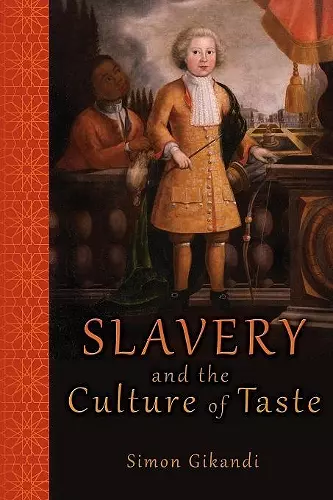Slavery and the Culture of Taste
Format:Paperback
Publisher:Princeton University Press
Published:2nd May '14
Currently unavailable, our supplier has not provided us a restock date

It would be easy to assume that, in the eighteenth century, slavery and the culture of taste - the world of politeness, manners, and aesthetics - existed as separate and unequal domains, unrelated in the spheres of social life. But to the contrary, Slavery and the Culture of Taste demonstrates that these two areas of modernity were surprisingly entwined. Ranging across Britain, the antebellum South, and the West Indies, and examining vast archives, including portraits, period paintings, personal narratives, and diaries, Simon Gikandi illustrates how the violence and ugliness of enslavement actually shaped theories of taste, notions of beauty, and practices of high culture, and how slavery's impurity informed and haunted the rarified customs of the time. Gikandi focuses on the ways that the enslavement of Africans and the profits derived from this exploitation enabled the moment of taste in European - mainly British - life, leading to a transformation of bourgeois ideas regarding freedom and selfhood. He explores how these connections played out in the immense fortunes made in the West Indies sugar colonies, supporting the lavish lives of English barons and altering the ideals that defined middle-class subjects. Discussing how the ownership of slaves turned the American planter class into a new aristocracy, Gikandi engages with the slaves' own response to the strange interplay of modern notions of freedom and the realities of bondage, and he emphasizes the aesthetic and cultural processes developed by slaves to create spaces of freedom outside the regimen of enforced labor and truncated leisure. Through a close look at the eighteenth century's many remarkable documents and artworks, Slavery and the Culture of Taste sets forth the tensions and contradictions entangling a brutal practice and the distinctions of civility.
Co-Winner of the 2011 James Russell Lowell Prize, Modern Language Association Co-winner of the 2012 Melville J. Herskovits Award, African Studies Association Winner of the 14th Annual (2012) Susanne M. Glasscock Humanities Book Prize for Interdisciplinary Scholarship, Melbern G. Glasscock Center for Humanities Research at Texas A&M University One of Choice's Outstanding Academic Titles for 2012 "In this at times disturbing and often provocative book, Gikandi seeks to bring together two seemingly disparate areas of experience, African slavery and European high culture... This impressive, and in places startling, book is sure to redirect the tide of contemporary 18th-century studies; it exemplifies critical inquiry into the 'global 18th century' at its best."--Choice "[T]his is an absorbing and otherwise well-executed study. It is nuanced, erudite and wide-ranging, shedding much valuable new light on the vexed relationships between eighteenth-century aesthetic culture and the outrageous history that shadows it."--Carl Plasa, Review of English Studies "Among the many strengths of this study is that it will engage scholars and students from a variety of disciplines, including the Atlantic world, British history and/or literature, colonial history both North American and Caribbean--and the slave trade. Gikandi is an engaging author, but he assumes some prior knowledge of the materials that he so intricately weaves into his remarkably detailed narrative."--Dorothy Potter, Sixteenth Century Journal "Interdisciplinary in approach, Slavery and the Culture of Taste is a virtuoso performance that mobilizes a vast amount of secondary literature and deploys a dazzling array of theory."--Ryan Whyte, Journal of Curatorial Studies "Slavery and the Culture of Taste is an important book that should be widely read by students of slavery and the modern world."--Ed Rugemer, Literature & History
- Winner of Modern Language Association James Russell Lowell Prize 2012
- Runner-up for African Studies Association Melville J. Herskovits Award 2012
- Short-listed for Choice Magazine Outstanding Reference/Academic Book Award 2012
ISBN: 9780691160979
Dimensions: unknown
Weight: 567g
392 pages